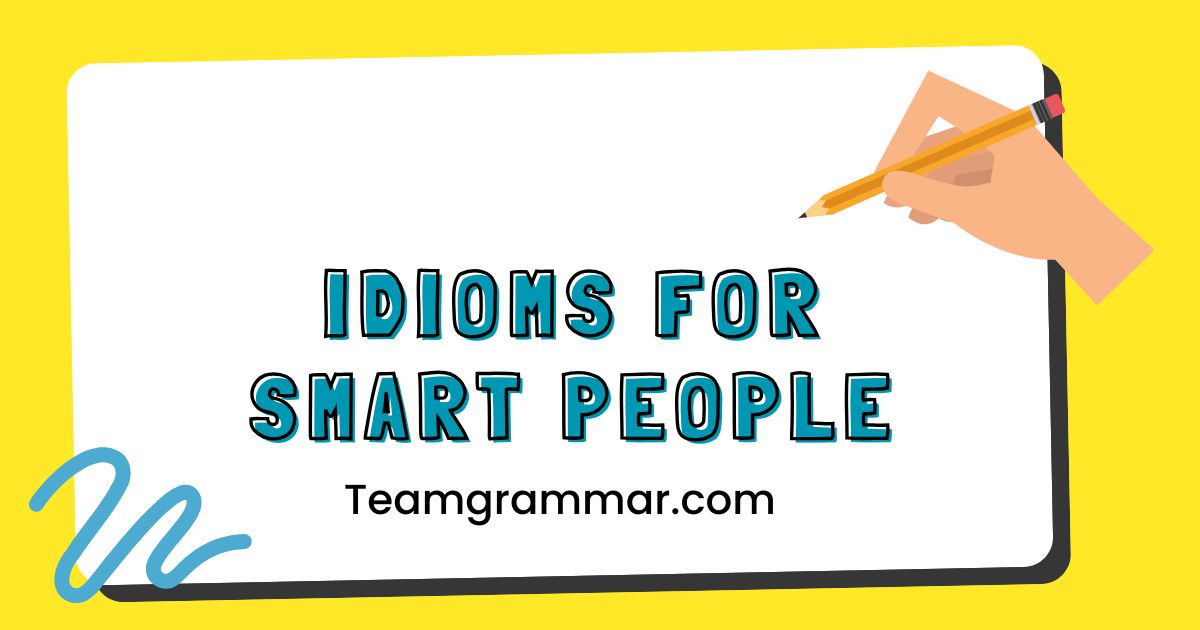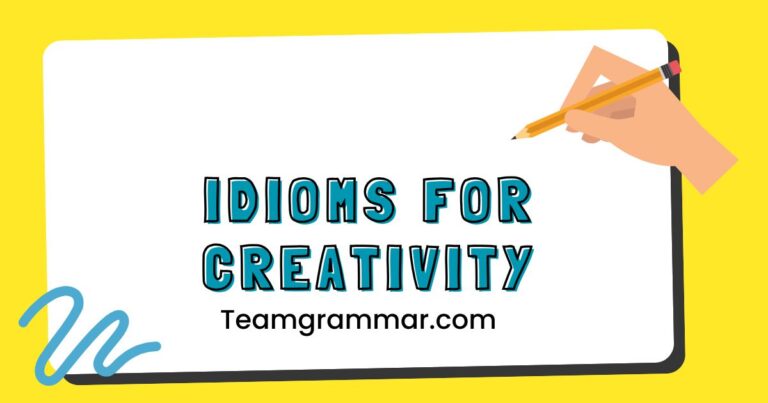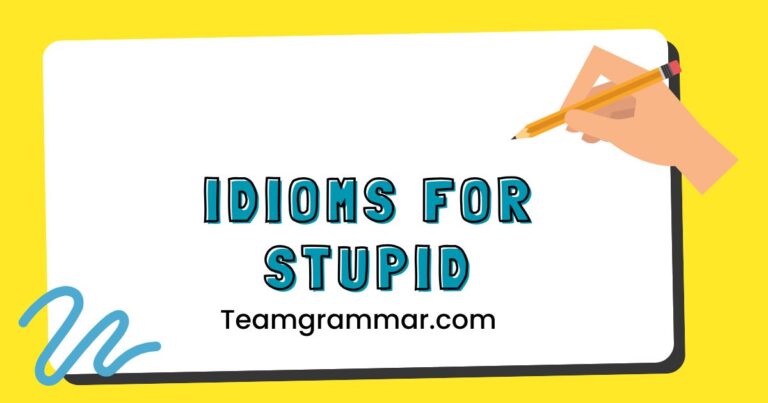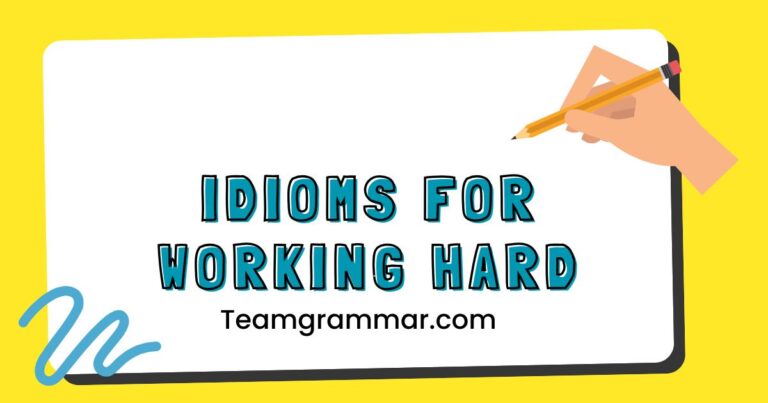50 Idioms for Smart People: Mastering Advanced English Expressions
Idioms are a crucial component of the English language, adding color, depth, and nuance to everyday communication. For advanced English learners and native speakers alike, understanding and using idioms effectively is a hallmark of fluency and cultural literacy.
These expressions, often defying literal interpretation, can significantly enhance your ability to express complex ideas succinctly and engagingly. This article delves into a carefully curated collection of idioms designed for the discerning mind, providing definitions, examples, usage rules, and practice exercises to help you master these linguistic gems and elevate your communication skills.
This comprehensive guide will explore the rich tapestry of idioms associated with intelligence, knowledge, and wisdom. Whether you’re aiming to impress in professional settings, enrich your writing, or simply understand native speakers better, this resource will equip you with the tools and knowledge to confidently navigate the idiomatic landscape of the English language.
From dissecting their structural components to avoiding common pitfalls, we’ll cover everything you need to become an idiom aficionado.
Table of Contents
- Definition of Idioms for Smart People
- Structural Breakdown of Idioms
- Types and Categories of Smart Person Idioms
- Examples of Idioms for Smart People
- Usage Rules for Idioms
- Common Mistakes with Idioms
- Practice Exercises
- Advanced Topics in Idiom Usage
- Frequently Asked Questions
- Conclusion
Definition of Idioms for Smart People
Idioms are expressions where the overall meaning differs from the literal meanings of the individual words. They are a unique feature of language, often reflecting cultural nuances and historical contexts.
When we refer to “Idioms for Smart People,” we’re focusing on idioms that are commonly used to describe intelligence, knowledge, wisdom, and related attributes. These idioms can enhance communication by providing a concise and vivid way to convey complex ideas about intellectual capacity.
Classification:Idioms can be classified in various ways based on their structure, meaning, or origin. For instance, some idioms are metaphorical (drawing comparisons), while others are metonymic (substituting related concepts).
Idioms related to intelligence often fall into the metaphorical category, using imagery to represent abstract qualities.
Function:The primary function of idioms is to add color and depth to language. They can make communication more engaging, memorable, and efficient.
In the context of describing intelligence, idioms can be used to praise someone’s intellect, critique their lack of understanding, or simply convey information about their cognitive abilities in a more evocative way than plain language.
Contexts:Idioms are used in a wide range of contexts, from casual conversations to formal writing. However, it’s crucial to be mindful of the audience and the situation when using idioms.
Some idioms are more appropriate for informal settings, while others are suitable for professional or academic contexts. Understanding the nuances of idiom usage is essential for effective communication.
Structural Breakdown of Idioms
Understanding the structure of idioms can help in grasping their meaning and usage. Idioms often consist of a combination of words that, when taken literally, don’t make sense.
However, when these words are used together in a specific order, they convey a particular meaning that is widely understood within a language community.
Components:Idioms can be composed of various grammatical elements, including nouns, verbs, adjectives, and prepositions. The specific combination of these elements determines the overall meaning and function of the idiom.
For example, the idiom “brain trust” consists of a noun (“brain”) and another noun (“trust”), but its meaning refers to a group of experts.
Patterns:While idioms don’t always follow strict grammatical rules, certain patterns can be observed. Some idioms are based on similes (using “like” or “as”), while others are based on metaphors (implied comparisons).
Recognizing these patterns can help in deciphering the meaning of unfamiliar idioms.
Variations:Idioms can sometimes have slight variations in their wording without significantly altering their meaning. For example, “sharp as a tack” and “sharp as a needle” both convey the idea of someone being intelligent.
However, it’s important to be aware of these variations and use them appropriately.
Types and Categories of Smart Person Idioms
Idioms related to intelligence can be categorized based on the specific aspect of intelligence they describe. Here are some common categories:
1. General Intelligence
These idioms describe overall intelligence or mental capacity. Examples include “sharp as a tack,” “quick on the uptake,” and “on the ball.”
2. Wisdom and Insight
These idioms refer to the ability to make sound judgments and understand complex situations. Examples include “an old head on young shoulders,” “sage advice,” and “street smart.”
3. Knowledge and Education
These idioms describe the acquisition and application of knowledge. Examples include “book smart,” “well-read,” and “know something inside out.”
4. Cleverness and Wit
These idioms refer to the ability to think quickly and creatively. Examples include “whip-smart,” “have a knack for,” and “think outside the box.”
5. Lack of Intelligence
These idioms describe a lack of intelligence or understanding. Examples include “not the sharpest tool in the shed,” “slow on the uptake,” and “out to lunch.”
Examples of Idioms for Smart People
This section provides a comprehensive list of idioms related to intelligence, categorized for clarity. Each idiom is accompanied by a definition and example sentence.
Table 1: Idioms Describing General Intelligence
The following table focuses on idioms that describe general intelligence, providing a clear definition and illustrative example for each.
| Idiom | Definition | Example Sentence |
|---|---|---|
| Sharp as a tack | Very intelligent and quick-witted. | She’s as sharp as a tack; she always understands complex concepts immediately. |
| Quick on the uptake | Able to understand things quickly. | He’s very quick on the uptake, so he doesn’t need things explained to him repeatedly. |
| On the ball | Alert, competent, and efficient. | Our project manager is really on the ball; she anticipates problems before they arise. |
| Bright spark | A clever and intelligent person. | He’s a bright spark; he always comes up with innovative solutions. |
| Has all their marbles | Mentally sound and intelligent. | Despite his age, he still has all his marbles and can contribute meaningfully to the discussion. |
| Brainy | Intelligent; having a good intellect. | She’s incredibly brainy and excels in all her academic pursuits. |
| Gifted | Having exceptional talent or natural ability. | The school recognized her as gifted and provided her with advanced learning opportunities. |
| Smart cookie | A clever or intelligent person. | He’s a smart cookie; he figured out the solution to the problem in no time. |
| Not born yesterday | Experienced and not easily fooled. | You can’t trick him; he wasn’t born yesterday and knows all the scams. |
| A cut above | Superior to others in intelligence or ability. | Her research is a cut above the rest, demonstrating exceptional insight and analysis. |
| One smart apple | A particularly intelligent person. | She’s one smart apple and always has the answers in class. |
| Knows their stuff | Is knowledgeable and competent in a particular area. | When it comes to astrophysics, she really knows her stuff. |
| Has a good head on their shoulders | Is sensible and intelligent. | She has a good head on her shoulders and makes wise decisions. |
| Quick-witted | Able to think and respond quickly and intelligently. | His quick-witted responses made him a valuable asset in debates. |
| Sharp-witted | Having or showing alertness and intelligence. | Her sharp-witted commentary always adds depth to the discussion. |
| On the beam | Thinking or acting correctly; well-informed. | He’s always on the beam when it comes to understanding market trends. |
| With it | Alert, intelligent, and up-to-date. | Despite his age, he’s still very with it and keeps up with current events. |
| Think on one’s feet | To react to events decisively, effectively, and intelligently. | In the crisis, she had to think on her feet to come up with a solution. |
| Have one’s wits about one | To be alert and intelligent. | You need to have your wits about you when dealing with complex problems. |
| Five-star brain | Extremely intelligent or brilliant. | She’s got a five-star brain and can solve any problem you throw at her. |
| A walking encyclopedia | Someone who seems to know everything. | Ask him anything about history; he’s a walking encyclopedia. |
| A whiz | A person who is extremely skilled at something. | He’s a whiz at computer programming. |
| A mastermind | A person with an outstanding intellect. | She’s the mastermind behind the company’s successful marketing strategy. |
Table 2: Idioms Describing Wisdom and Insight
This table presents idioms that specifically describe wisdom and insight, highlighting the ability to make sound judgments and understand complex situations.
| Idiom | Definition | Example Sentence |
|---|---|---|
| An old head on young shoulders | A young person who thinks and acts like an older, more experienced person. | She’s only 18, but she has an old head on young shoulders and gives excellent advice. |
| Sage advice | Wise and insightful counsel. | He sought sage advice from his mentor before making a major career decision. |
| Street smart | Having the knowledge and skills necessary to survive in a difficult or dangerous environment. | Growing up in a tough neighborhood made him street smart and resourceful. |
| See the bigger picture | To understand the overall context and implications of a situation. | Good leaders can see the bigger picture and make decisions that benefit the entire organization. |
| Read between the lines | To understand the hidden or implied meaning of something. | You have to read between the lines to understand what he’s really trying to say. |
| Wise as an owl | Very wise and knowledgeable. | My grandmother is as wise as an owl, always giving thoughtful advice. |
| Learned the hard way | Gained knowledge or wisdom through difficult or painful experiences. | He learned the hard way that you can’t trust everyone. |
| Seasoned | Experienced and knowledgeable, often through long involvement in a particular field. | She’s a seasoned professional with years of experience in the industry. |
| Been around the block | Experienced and knowledgeable about the world, often through having faced many challenges. | He’s been around the block and knows how to handle difficult situations. |
| Think long and hard | To consider something very carefully before making a decision. | She had to think long and hard before accepting the job offer. |
| Have seen the light | To come to a realization or understanding after a period of confusion or ignorance. | After the lecture, he finally saw the light and understood the importance of the topic. |
| Have a hunch | To have an intuitive feeling or premonition about something. | I have a hunch that something good is going to happen. |
| Keep your ear to the ground | To pay attention to what is happening around you and be aware of current trends or rumors. | If you want to succeed in this industry, you need to keep your ear to the ground. |
| Know which way the wind blows | To understand the current situation and anticipate future events. | He knows which way the wind blows and always positions himself for success. |
| Have a sixth sense | To have an intuitive ability to perceive things beyond the normal senses. | She seems to have a sixth sense for detecting danger. |
| A gut feeling | An intuitive feeling or instinct about something. | I had a gut feeling that something was wrong. |
| Have a nose for something | To have a natural talent or instinct for finding or recognizing something. | She has a nose for spotting promising investment opportunities. |
| Read the room | To understand the mood or atmosphere of a situation and act accordingly. | He’s good at reading the room and knows when to lighten the mood. |
| Think outside the box | To think creatively and unconventionally. | To solve this problem, we need to think outside the box. |
| Connect the dots | To understand the relationship between different pieces of information. | Once you connect the dots, the whole picture becomes clear. |
Table 3: Idioms Describing Knowledge and Education
This table showcases idioms that relate specifically to knowledge and education, focusing on the acquisition and application of learning.
| Idiom | Definition | Example Sentence |
|---|---|---|
| Book smart | Intelligent and knowledgeable due to academic study. | He’s book smart, but he lacks practical experience. |
| Well-read | Having read many books and being knowledgeable. | She’s well-read and can discuss a wide range of topics. |
| Know something inside out | To know something very well. | He knows this software inside out; he can fix any problem. |
| Learn the ropes | To learn the basics of a job or task. | It takes time to learn the ropes when you start a new job. |
| Pick up something | To learn something new, often informally. | She picked up Spanish while traveling in Spain. |
| Brush up on something | To review or improve your knowledge of something. | I need to brush up on my French before my trip to Paris. |
| Hit the books | To study hard. | I have to hit the books to prepare for my exams. |
| Burning the midnight oil | Working or studying late into the night. | She’s been burning the midnight oil to finish her thesis. |
| Know something backwards | To know something extremely well. | He knows this city backwards; he can navigate it without a map. |
| A quick study | Someone who learns new things quickly. | She’s a quick study and adapted to the new system in no time. |
| Get the hang of something | To learn how to do something. | It took me a while to get the hang of coding, but now I love it. |
| Be a sponge | To absorb information quickly and easily. | Children are like sponges, absorbing everything they see and hear. |
| Go back to school | To return to education to learn new skills or gain qualifications. | She decided to go back to school to get her master’s degree. |
| Major in something | To specialize in a particular subject at university. | He majored in computer science. |
| Minor in something | To study a secondary subject at university. | She minored in creative writing. |
| Well-versed in | Knowledgeable about a particular subject. | He is well-versed in the history of art. |
| A mine of information | A person who knows a lot about a particular subject. | Ask her about gardening; she’s a mine of information. |
| Have at your fingertips | To have information or knowledge readily available. | With the internet, we have a wealth of information at our fingertips. |
| Learn by heart | To memorize something. | Actors have to learn their lines by heart. |
| Pass with flying colors | To pass a test or exam easily and with a high score. | She passed her driving test with flying colors. |
Table 4: Idioms Describing Cleverness and Wit
This table lists idioms that describe cleverness and wit, focusing on the ability to think quickly and creatively.
| Idiom | Definition | Example Sentence |
|---|---|---|
| Whip-smart | Extremely intelligent and quick-witted. | She’s whip-smart and always has a clever comeback. |
| Have a knack for | To have a natural talent or ability for something. | He has a knack for solving complex problems. |
| Think outside the box | To think creatively and unconventionally. | To come up with innovative solutions, we need to think outside the box. |
| Play it smart | To act in a clever and strategic way. | If you want to succeed, you need to play it smart. |
| Outsmart someone | To be more clever than someone else and gain an advantage. | She managed to outsmart her opponent in the negotiation. |
| Brainstorm | To generate a lot of ideas quickly. | Let’s brainstorm some new marketing strategies. |
| Have a lightbulb moment | To suddenly have a brilliant idea or realization. | I had a lightbulb moment when I realized the solution to the puzzle. |
| Quick study | Someone who learns things quickly. | He’s a quick study and picked up the new software in no time. |
| Pull a rabbit out of a hat | To do something unexpected and impressive. | She pulled a rabbit out of a hat and saved the project at the last minute. |
| Think on your feet | To react quickly and intelligently to unexpected situations. | You need to be able to think on your feet in this job. |
| Use your head | To think carefully and intelligently. | Use your head and come up with a better solution. |
| Have your wits about you | To be alert and intelligent in a difficult situation. | You need to have your wits about you when dealing with angry customers. |
| Fast talker | Someone who is good at persuading people. | He’s a fast talker and can convince anyone to do anything. |
| Silver-tongued | Eloquent and persuasive. | The politician was silver-tongued and easily won over the crowd. |
| Street smart | Having the knowledge and skills to survive in a difficult environment. | He’s street smart and knows how to handle himself in tough situations. |
| Wise guy | Someone who makes sarcastic or clever remarks. | He’s a wise guy and always has a witty comeback. |
| Have a way with words | To be good at expressing yourself. | She has a way with words and can write beautifully. |
| Turn of phrase | A particular way of expressing something. | He has an interesting turn of phrase. |
| A clever Dick | Someone who is annoyingly clever. | He’s such a clever Dick, always trying to show off his intelligence. |
Table 5: Idioms Describing a Lack of Intelligence
This table focuses on idioms used to describe a lack of intelligence or understanding, offering a contrasting perspective.
| Idiom | Definition | Example Sentence |
|---|---|---|
| Not the sharpest tool in the shed | Not very intelligent. | He’s not the sharpest tool in the shed, but he’s a hard worker. |
| Slow on the uptake | Slow to understand things. | He’s a bit slow on the uptake, so you need to explain things carefully. |
| Out to lunch | Not paying attention or not understanding what’s going on. | He seems to be out to lunch today; he’s not responding to anything. |
| Dim-witted | Stupid or unintelligent. | He’s a bit dim-witted and often makes silly mistakes. |
| Not playing with a full deck | Not very intelligent or mentally stable. | I don’t think he’s playing with a full deck; he says some strange things. |
| A few bricks short of a load | Not very intelligent. | He’s a few bricks short of a load, but he means well. |
| Not all there | Not fully mentally present or aware. | She seems not all there today; she’s been very quiet. |
| Lost for words | Unable to think of anything to say. | I was lost for words when I heard the news. |
| Thick as a brick | Very stupid. | He’s as thick as a brick and can’t understand simple instructions. |
| Dense | Slow to understand. | He’s so dense; I have to explain everything to him multiple times. |
| Doesn’t have a clue | Has no understanding or knowledge of something. | He doesn’t have a clue about what he’s doing. |
| In one ear and out the other | Heard but not remembered or understood. | Everything I tell him goes in one ear and out the other. |
| As daft as a brush | Very silly or foolish. | He’s as daft as a brush, always making silly jokes. |
| Slowpoke | Someone who is slow to understand or react. | He’s such a slowpoke; it takes him forever to get things done. |
| Brain-dead | Extremely unintelligent or lacking in mental activity. | He’s so brain-dead; he can’t even remember his own name. |
| Numbskull | A stupid person. | Don’t be such a numbskull; think before you act. |
| Bonehead | A stupid person. | He’s such a bonehead; he always makes the same mistakes. |
| Blockhead | A stupid person. | Don’t be a blockhead; use your common sense. |
| Airhead | A silly or unintelligent person. | She’s such an airhead; she never knows what’s going on. |
| Empty-headed | Lacking intelligence or serious thought. | He’s an empty-headed fool. |
Usage Rules for Idioms
Using idioms correctly requires attention to detail and an understanding of their nuances. Here are some key usage rules to keep in mind:
1. Context:Ensure that the idiom is appropriate for the context.
Some idioms are informal and should be avoided in formal settings.
2. Audience:Consider your audience’s familiarity with the idiom.
If you’re speaking to non-native speakers, it’s best to use idioms sparingly or explain their meaning.
3. Word Order:Maintain the correct word order of the idiom.
Changing the word order can alter the meaning or make the idiom nonsensical.
4. Tense and Agreement:Use the correct tense and agreement when using idioms.
For example, “He’s as sharp as a tack” (present tense) vs. “He was as sharp as a tack” (past tense).
5. Overuse:Avoid overuse of idioms.
Using too many idioms can make your language sound unnatural or forced.
Common Mistakes with Idioms
Many learners make common mistakes when using idioms. Here are some examples of incorrect and correct usage:
1. Literal Interpretation: Interpreting idioms literally instead of understanding their figurative meaning.
Incorrect: “He was really on a ball.” (Interpreting ‘ball’ literally)
Correct: “He was really on the ball.” (Meaning he was competent and efficient)
2. Incorrect Word Order: Changing the word order of an idiom.
Incorrect: “Tack as sharp as.”
Correct: “Sharp as a tack.”
3. Mixing Idioms: Combining parts of different idioms.
Incorrect: “Burning the midnight oil at both ends.” (Mixing “burning the midnight oil” and “burning the candle at both ends”)
Correct: “Burning the midnight oil.” or “Burning the candle at both ends.”
4. Using the Wrong Idiom: Selecting an idiom that doesn’t quite fit the intended meaning.
Incorrect: “He’s as bright as a button.” (While this implies cheerfulness, it doesn’t necessarily mean intelligent)
Correct: “He’s as sharp as a tack.” (Clearly conveys intelligence)
Practice Exercises
Test your understanding of idioms with these practice exercises. Choose the correct idiom to complete each sentence.
Exercise 1: Fill in the Blanks
Complete each sentence with the appropriate idiom from the list provided.
Idiom List: sharp as a tack, quick on the uptake, on the ball, an old head on young shoulders, street smart
| Question | Answer |
|---|---|
| 1. She’s only 16, but she has ________ and gives excellent advice. | an old head on young shoulders |
| 2. He’s very ________; he understands things almost instantly. | quick on the uptake |
| 3. Our new project manager is really ________; she never misses a detail. | on the ball |
| 4. You can’t fool her; she’s ________ and knows all the tricks. | street smart |
| 5. He’s ________; he always gets the highest grades in the class. | sharp as a tack |
| 6. Despite his age, he is still ________, handling complex situations with ease. | on the ball |
| 7. She is ________; the professor is always impressed with her insights. | sharp as a tack |
| 8. Being ________ helped him navigate the difficult streets of the city. | street smart |
| 9. She is ________ and can learn new software programs quickly. | quick on the uptake |
| 10. He may be young, but he has ________, making him a reliable advisor. | an old head on young shoulders |
Exercise 2: Multiple Choice
Choose the best idiom to complete each sentence.
| Question | Answer |
|---|---|
| 1. He’s not very intelligent; he’s not the ________. a) brightest star in the sky b) sharpest tool in the shed c) biggest fish in the sea |
b) sharpest tool in the shed |
| 2. She knows everything about computers; she ________. a) knows it inside out b) learns it by heart c) hits the books |
a) knows it inside out |
| 3. To solve this problem, we need to ________. a) think inside the box b) think outside the box c) hit the books |
b) think outside the box |
| 4. She is very experienced; she has ________. a) been around the block b) hit the books c) seen the light |
a) been around the block |
| 5. He is very wise; he gives ________. a) sage advice b) street smarts c) quick updates |
a) sage advice |
| 6. After studying all night, he was ________ for the exam. a) hitting the books b) burning the midnight oil c) thinking outside the box |
b) burning the midnight oil |
| 7. Since she grew up in the city, she is ________. a) a bookworm b) street smart c) a quick study |
b) street smart |
| 8. He needed to ________ before his trip to Italy. a) hit the books b) brush up on his Italian c) think on his feet |
b) brush up on his Italian |
| 9. To understand the situation, you need to ________. a) learn by heart b) connect the dots c) think outside the box |
b) connect the dots |
| 10. She ________ and passed the test easily. a) passed with flying colors b) burned the midnight oil c) learned the ropes |
a) passed with flying colors |
Advanced Topics in Idiom Usage
For advanced learners, mastering idioms involves more than just understanding their definitions. It also requires an understanding of their historical context, cultural significance, and subtle nuances.
Here are some advanced topics to consider:
1. Historical Origins:Many idioms have fascinating historical origins that can shed light on their meaning and usage.
Researching the etymology of idioms can provide a deeper understanding of their cultural significance.
2. Regional Variations:Idioms can vary significantly from one region to another.
What is a common idiom in one country may be completely unfamiliar in another. Being aware of these regional variations is essential for effective communication.
3. Figurative Language:Idioms are a form of figurative language, which also includes metaphors, similes, and analogies.
Understanding the relationship between idioms and other forms of figurative language can enhance your overall language skills.
4. Idiomaticity:Idiomaticity refers to the degree to which an expression is fixed and predictable.
Some idioms are highly idiomatic, meaning that their meaning cannot be derived from the individual words. Others are less idiomatic and can be understood more easily.
Frequently
Questions
Conclusion
Mastering idioms is an essential step in achieving fluency and sophistication in the English language. By understanding their definitions, usage rules, and common pitfalls, you can confidently incorporate idioms into your communication and enhance your ability to express complex ideas in a vivid and engaging way.
Keep practicing, stay curious, and continue to explore the rich and diverse world of English idioms.







